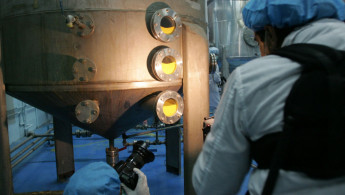US calls on Iran to address nuclear concerns for diplomatic space
Iran must take "de-escalatory" steps on its nuclear program if it wants to make space for diplomacy with the United States, starting by cooperating with the International Atomic Energy Agency (IAEA), the U.S. State Department said on Tuesday.
The comments by spokesman Matt Miller at a briefing was the second time in recent days that the United States has criticized Iran for its decision to bar multiple IAEA inspectors assigned to the country, hindering the U.N. nuclear watchdog's oversight of Tehran's atomic activities.
The United States and many of its Western allies fear Iran's nuclear program may be a cover for developing nuclear weapons. Iran denies having such ambitions.
"Iran must take de-escalatory steps if it wants to reduce tensions and create a space for diplomacy," Miller said.
"Just in the last few weeks, we've seen Iran take steps to undermine the International Atomic Energy Agency's ability to do its work," Miller said. "So if Iran really is serious about taking de-escalatory steps, the first thing it (could) do would be to cooperate with the IAEA."
Miller said the steps he was talking about as a potential prelude to renewed U.S.-Iran talks, whether direct or indirect, had to do with the Iranian nuclear program, though he did not provide further details.
However, asked if he was saying Iran must take all such steps sought by the United States before Washington would agree to direct or indirect talks with Tehran, he replied: "I am not saying that."
The IAEA was responsible for verifying Iran's compliance with the defunct 2015 Iran nuclear deal, under which Tehran curbed its nuclear program in return for the easing of U.S., European Union and U.N. sanctions.
Attempts to revive that deal, abandoned by then-U.S. President Donald Trump in 2018, collapsed about a year ago and Washington has been searching for a new way to get Tehran to restrain its program.




 Follow the Middle East's top stories in English at The New Arab on Google News
Follow the Middle East's top stories in English at The New Arab on Google News


![A group of Palestinians, foreign and Israeli activists gather to participated in an olive picking event on the land in the town of Battir, which is under threat of confiscation by Israel in Bethlehem, occupied West Bank on 8 November 2024. [Getty]](/sites/default/files/styles/image_330x185/public/2182930803.jpeg?h=199d8c1f&itok=__0LgGsa)